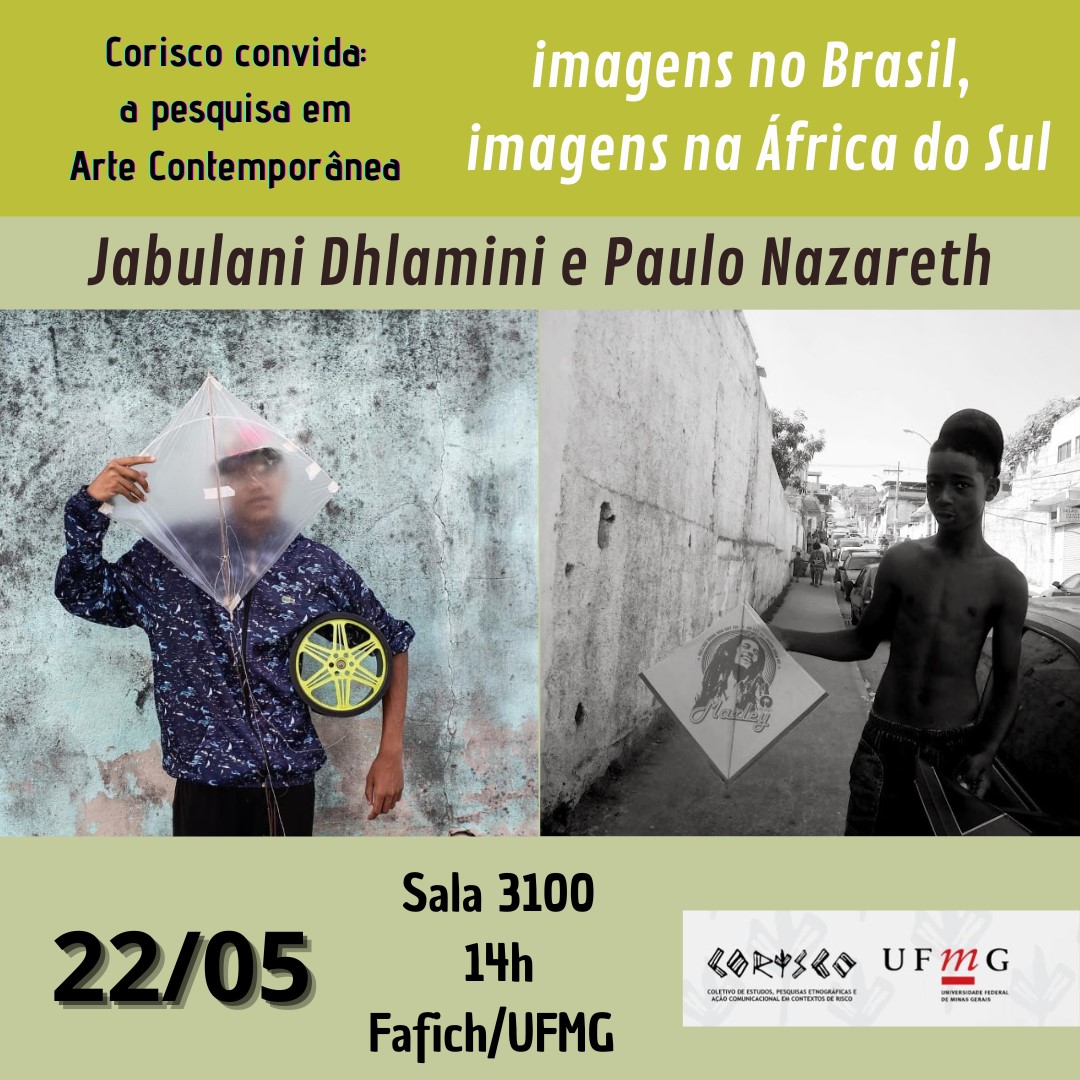Notícia
22 de Maio de 2023
Corisco Convida: imagens no Brasil, imagens na África do Sul
Olás!
Com muita alegria, te convidamos a participar de uma roda de conversa com os artistas Jabulani Dhlamini e Paulo Nazareth (ver bios abaixo) na segunda-feira, 22/05, às 14h, sala 3100 da Fafich.
Os artistas mostrarão imagens por eles produzidas no Brasil e na África do Sul, falando de seus processos de pesquisa artística e de criação nas intrincadas relações entre memória, arquivo e fabulação nas trincheiras das lutas de linguagem para o enfrentamento ao racismo-colonialismo.
Tais formas de pesquisa permitem aproximações com pesquisas nos mais diversos regimes de conhecimentos, incluindo o acadêmico, relacionadas às imagens e lutas de re-existência, imaginação, territórios e saberes, oralidade, performances, afetos, lutas por autorrecuperação e auto-definição, disputas no campo da memória e da re-leitura/re-feitura/rasura de arquivos.
A conversa decorrerá em Português e em Inglês (com tradução subsequente), com referências ao Zulu, ao Xhosa, ao Guarani, ao Borum-Krenak e ao Pretuguês.
Esperamos vocês!
Grupo Corisco
----
JABULANI DHLAMINI
(b. 1983, Free State, South Africa) lives and works in Johannesburg. Dhlamini majored in documentary photography at the Vaal University of Technology, graduating in 2010. He is an alumni fellow of the Edward Ruiz Mentorship programme and the Market Photo Workshop in Johannesburg. His work focuses on his upbringing while also reflecting on various communities within contemporary South Africa. Dhlamini's approach is meditative and subtly provokes a closer look at what lies on the edges through an exploration of personal and collective memory. Incorporating landscape imagery and intimate portraits, his work captures historical moments such as the recollection of the Sharpeville Massacre, the effects of land dispossession and the funeral of anti-apartheid activist Winnie Madikizela-Mandela while also documenting the quieter moments in the lives of everyday South Africans.
Dhlamini's Umama series was exhibited as part of his Edward Ruiz award at the Market Photo Workshop in 2012, and at Goodman Gallery Cape Town in 2013 his first solo exhibition with the gallery. In Umama, Dhlamini pays homage to single mothers and explores the challenges faced by women raising children on their own in South African townships. For his Recaptured series, which was exhibited at Goodman Gallery in 2016, Dhlamini turned to the community of Sharpeville, asking people to bring objects that reminded them of the 1960 massacre. Over the course of several years, Dhlamini interviewed and photographed a number of individuals who traced their movements and emotions on the day of the Sharpeville Massacre, relocating themselves within the collective memory.
In 2018 Dhlamini's work was featured on the Five Photographers, A Tribute to David Goldblatt group exhibition at the Gerard Sekoto Gallery at the French Institute. In his 2018 exhibition at Goodman Gallery, iXesha!, Dhlamini explored how memory is created and archived within a community where the memory has been localised. This exhibition included images from Dhlamini's recent series iQhawekazi documenting the events around Winnie Mandela's funeral.
In his most recent exhibition with the Gallery, the everyday waiting, Dhlamini photographed his community in Soweto during the first four months of the national lockdown, drawing attention to the psychological impact of COVID-19.
At this moment, Jabulani Dhlamini is artist in residence in Belo Horizonte and Santa Luzia MG/Brazil, hosted by Mitre Gallery and Casa Borum/Paulo Nazareth Arte Contemporânea LTDA and he will soon present an exhibition with images he has produced in the city and its surroundings, townships and traditional territories.
----
PAULO NAZARETH
Homem velho nascido em Borun Nak [Vale do Rio Doce] Minas Gerais, e vivendo como um nômade global, a obra de Paulo Nazareth é muitas vezes resultado de gestos precisos e simples, que trazem ramificações mais amplas, sensibilizando para questões ligadas à imigração, racismo e colonialismo. Embora seu trabalho possa se manifestar em vídeo, fotografia e objetos colecionados, seu meio mais forte é o cultivo e construção de relacionamentos com indivíduos que cruzam o seu caminho especialmente aqueles colocados à margem devido ao seu status legal ou reprimidos pelas autoridades governamentais.
Paulo Nazareth (homem velho nascido em Borun Nak [Vale do Rio Doce] / Pindorama [BR]). Vive e trabalha pelo mundo.
Suas exposições individuais incluem STROKE, The Power Plant, Toronto, Canada (2022); VUADORA, Pivô, São Paulo, Brasil (2022); Paulo Nazareth, ICA Miami, Miami, EUA (2019); Faca Cega, Museu de Arte da Pampulha, Belo Horizonte, Brasil (2018); Journal, Institute for Contemporary Arts, Londres, Reino Unido (2014), Premium Bananas, MASP, São Paulo, Brasil (2013). Exposições coletivas recentes incluem BRASIL FUTURO: AS FORMAS DA DEMOCRACIA, Museu Nacional da República, Brasília, Brasil (2023); Histórias Brasileiras, MASP, São Paulo, Brasil (2022); ; Afro-Atlantic Histories, National Gallery of Art, Washington DC, EUA (2022); 34ª Bienal de São Paulo, São Paulo, Brasil (2021); Beyond the Black Atlantic, Kunstverein Hannover, Hanover, Alemanha (2020); 22nd Sydney Biennial, Sydney, Austrália (2020); EXTREME. NOMADS, Museum für Moderne Kunst, Frankfurt, Alemanha (2018); The Lotus in Spite of the Swamp, Prospect.4 Triennial, Nova Orleans, EUA (2017); Soft Power Arte Brasil, Kunsthal KAdE, Amersfoort, Países Baixos (2016); Much wider than a line, SITE Santa Fe, Santa Fe, EUA (2016); New Shamans/Novos Xamãs: Brazilian Artists, Rubell Family Collection, Miami, EUA (2016); Indigenous Voices, Latin American Pavilion 56th Venice Biennale, Veneza, Itália (2015).
--
Luciana de Oliveira
Departamento de Comunicação Social DCS
Faculdade de Filosofia e Ciências Humanas FAFICH
Universidade Federal de Minas Gerais UFMG


 Faculdade de Filosofia e Ciências Humanas (FAFICH)
Faculdade de Filosofia e Ciências Humanas (FAFICH)